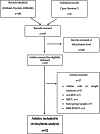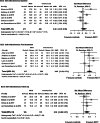Can metacognitive interventions improve insight in schizophrenia spectrum disorders? A systematic review and meta-analysis
- PMID: 33050956
- PMCID: PMC7610184
- DOI: 10.1017/S0033291720003384
Can metacognitive interventions improve insight in schizophrenia spectrum disorders? A systematic review and meta-analysis
Abstract
Background: Patients with schizophrenia spectrum disorders (SSD) tend to lack insight, which is linked to poor outcomes. The effect size of previous treatments on insight changes in SSD has been small. Metacognitive interventions may improve insight in SSD, although this remains unproved.
Methods: We carried out a systematic review and meta-analysis of randomized controlled trials (RCTs) to examine the effects of metacognitive interventions designed for SSD, namely Metacognitive Training (MCT) and Metacognitive Reflection and Insight Therapy (MERIT), on changes in cognitive and clinical insight at post-treatment and at follow-up.
Results: Twelve RCTs, including 10 MCT RCTs (n = 717 participants) and two MERIT trials (n = 90), were selected, totalling N = 807 participants. Regarding cognitive insight six RCTs (n = 443) highlighted a medium effect of MCT on self-reflectiveness at post-treatment, d = 0.46, p < 0.01, and at follow-up, d = 0.30, p < 0.01. There was a small effect of MCT on self-certainty at post-treatment, d = -0.23, p = 0.03, but not at follow-up. MCT was superior to controls on an overall Composite Index of cognitive insight at post-treatment, d = 1.11, p < 0.01, and at follow-up, d = 0.86, p = 0.03, although we found evidence of heterogeneity. Of five MCT trials on clinical insight (n = 244 participants), which could not be meta-analysed, four of them favoured MCT compared v. control. The two MERIT trials reported conflicting results.
Conclusions: Metacognitive interventions, particularly Metacognitive Training, appear to improve insight in patients with SSD, especially cognitive insight shortly after treatment. Further long-term RCTs are needed to establish whether these metacognitive interventions-related insight changes are sustained over a longer time period and result in better outcomes.
Keywords: Insight; metacognitive interventions; outcomes; schizophrenia spectrum disorders.
Figures




References
-
- Aghotor, J., Pfueller, U., Moritz, S., Weisbrod, M., & Roesch-Ely, D. (2010). Metacognitive training for patients with schizophrenia (MCT): Feasibility and preliminary evidence for its efficacy. Journal of Behavior Therapy and Experimental Psychiatry, 41(3), 207–211. doi: 10.1016/j.jbtep.2010.01.004. - DOI - PubMed
-
- Ahuir, M., Cabezas, Á, Miñano, M. J., Algora, M. J., Estrada, F., Solé, M., … Labad, J. (2018). Improvement in cognitive biases after group psychoeducation and metacognitive training in recent-onset psychosis: A randomized crossover clinical trial. Psychiatry Research, 270, 720–723. doi: 10.1016/j.psychres.2018.10.066. - DOI - PubMed
-
- Amador, X.F., & David, A. S. (Eds.). (2004). Insight and psychosis (2nd ed.). New York: Oxford University Press.

